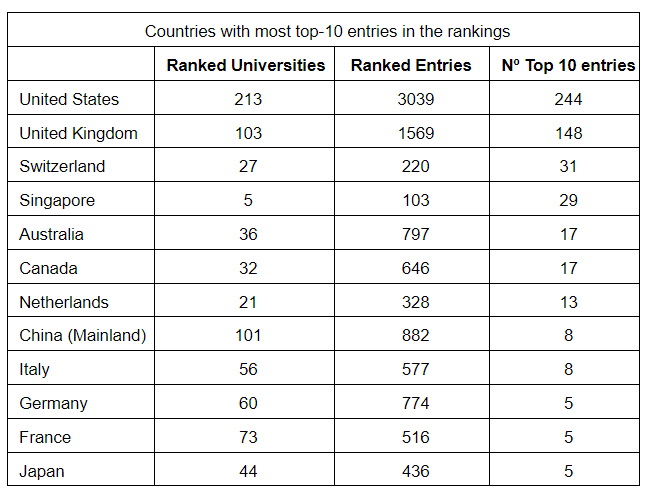Global higher education analyst QS Quacquarelli Symonds released the fourteenth edition of the QS World University Rankings by Subject: an independent comparative analysis of academic excellence featuring 1500+universities in 96 countries and territories across 55 disciplines. The QS rankings were consulted over 60 million times in 2023 on TopUniversities.com and referenced 124,000 times by worldwide media and institutions.

Global Highlights
- US universities lead in 32 subjects. Harvard University is the world's strongest-performing institution, first in 19 disciplines. MIT follows, leading in 11 subjects.
- UK institutions lead 16 subjects. The University of Oxford tops four, followed by the University of Cambridge, UCL, Royal College of Art and Royal College of Music with two.
- Switzerland boasts the highest concentration of #1 entries (4) proportionally to its ranked universities. ETH Zurich leads in three subjects, making it Continental Europe's strongest institution.
- Australia's Universities of Melbourne and Sydney boast the world's most top-100 subjects, 53 and 52.
- France is the most internationally collaborative research hub, with 23 entries among the top-10 for International Research Network.
- Japan reverses more than five years of decline. 26% of its previously-ranked entries climb, 21% drop and 42% remain stable - an overall improvement of 5%.
- China is the third most represented country. It ranks in the top-10 for eight subjects. Tsinghua University achieves its three highest ranks, including top-performer, History of Art (5th).
- India's ranked entries and overall performance soared by 19% and 17%, respectively.
- Brazil is Latin America's most-represented country overall and among the top 100. Mexico boasts the region's most top-20 entries (4).
- Saudi Arabia's KFUPM offers the Arab Region's highest-ranked programmes, Petroleum Engineering (5th) and Mineral & Mining Engineering (8th).
- Africa's leader, Cape Town University, ranks 15th globally in Development Studies.
QS Senior Vice President Ben Sowter said: With rising global inflation, geo-political instability and general elections in 50+ countries, supporting higher education and international student mobility has never been more critical as it drives innovation and societal advancement. QS' largest ever-university comparative analysis highlights the importance of diversity, research partnerships, investment, and cross-border academic and industry collaborations."










